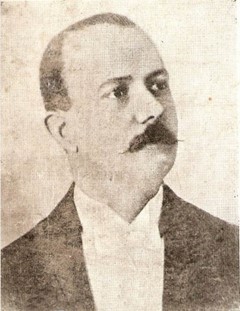The story of Isaac Newell
By Niamh Maloney, Mayfield Grammar School
From Fishmonger’s Son to Football Trailblazer

Football – an institution as British as fish and chips. A sport that generates a sense of pride and community amongst people all over the world, and a sport that inspires many individuals, including Isaac Newell, a fishmonger’s son who lived in the small Kent village of Higham. Though essentially unheard of in his local area, Newell’s name would later become attached to famous figures like Maradona and Messi. But how so? And through that, does that mean Newell deserves greater recognition within local and even national history? I believe Newell does, as a visionary pioneer of what we humans like to call ‘the beautiful game’.
Newell deserves recognition as a trailblazer in introducing the sport of football to Argentina, sharing what he viewed to be something that resonated with his British culture. Isaac Newell was born in Strood in 1853 but moved to Higham a few years later to live with his family near the Higham Place. Then in 1869, aged just 16, Newell boarded a boat for Argentina, perhaps like many other young men of the Victorian era, in hopes of seeking out employment in the new lucrative businesses of farming and railways in South America. Newell would first work as a telegraphist for the Central Argentinian Railway, yet, in 1884, he would change profession to become a teacher (which coincided with the first set of rules and football arriving in Argentina). Newell would become known for integrating football and sport into his students’ timetables, alongside academic study. I think this shows Newell’s intention to form a greater bond between the students and himself through the sharing of sport and tradition. Newell’s endeavour represents an example of the expansion of the British sphere in a manner not directly influenced by imperialism – as was popular in Victorian Britain - but rather by economic and social ventures, something that deserves highlighting as a positive anomaly in British history.
Furthermore, Newell’s introduction of football to the students would allow for the sport to be developed into something distinctly Argentinian. His students soon grew tired of kicking their football around the schoolyard, so Newell bought land next to the school specifically for the purposes of practicing and playing football. Both teachers and students would play against and with one another, leading to the creation of a joint team of teachers, students, and alumni in 1903. Its name? Newell’s Old Boys, in Issac’s honour. The club would go on to be a successful team in Argentinian leagues, even playing in the Top Primera Division since 1939. In addition to this, the club housed Diego Maradona in 1993, during some of the darker times of his career, as well as Lionel Messi for the youth team before he left for Barcelona. Arguably, Football is the most (if not one of) the most popular sports in Argentina, and Newell’s contribution in terms of leadership and talent finding to a sport that made Argentina $200 million in transfer fees alone – according to FIFA 2022 statistics – is one of great significance and should be awarded greater credit.
At the heart of this however, Issac Newell simply embodied the spirit of football. He was known to be hospitable and generous in nature, always supporting his family, colleagues, and students in achieving their aspirations. This translated into the image of his team, who in Spanish are called ‘leprosos’ (lepers) due to their partaking in a charity match for a leprosy hospital in the 1920s, a shining example of the humanity and selflessness the club represented. Messi would also pay tribute to Maradona and the club in 2020 by revealing a No.10 Maradona Old Boys jersey underneath his own after scoring the final goal to have Barcelona beat Osasuna 4-0. Newell therefore deserves greater recognition for using his passion for sport to uplift others and encouraged them to realise their potential.
Truly, it seems Issac Newell appreciated his role as both a teacher and a pioneer, but whether he realised it in his lifetime or not, Newell’s desire to share his love of sport with others would go on to influence people all around the world. Yes, there are a multitude of problems with football: there is racism, gender disparity and the plagues of hooliganism. Yet, Newell reminds us all of the enrichment one can gain physically and mentally from sport. He also exemplified something truly amazing about humanity: the longing for adventure and exploration. Issac Newell’s love and development of the ‘beautiful game’ and its impact on people’s live should never be forgotten and should have greater recognition in local and world history. This need for recognition has inspired a small group of supporters of the club to petition for a statue in his honour in his birth county, which would be not too bad of a memorial for a fishmonger’s boy whose passion for ball games changed the lives of so many people, and the course of football history, forever.

